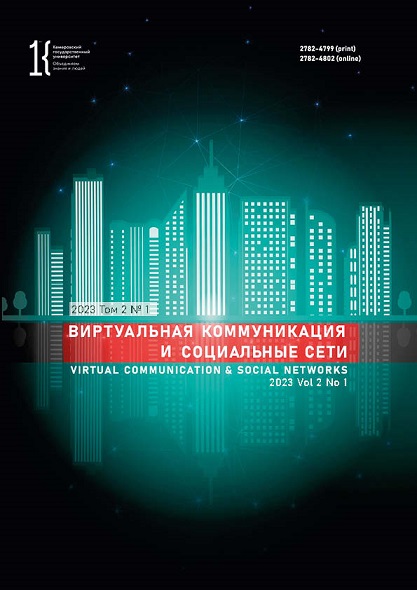Krasnoyarsk, Russian Federation
The article discusses the problem of online communication in higher education. It describes how digital business correspondence can develop communicative skills in university students. Analysis and systematization were used as review methods. Internet platforms can teach students to communicate in various situations of oral, written, and virtual communication in their professional sphere. By studying text samples from social networks, blogs, and e-mail correspondence, they learn to integrate communicative experience and observe Internet interaction in specific situations. They also learn to navigate in a constantly changing Internet environment and develop critical thinking. The ability to compose epistolary texts of different genres will help them to correspond with any type of communicants on various Internet platforms using appropriate style and nettiquette in social networks, forums, chat rooms, blogs, Internet comments, and e-mail correspondence.
communication, Internet communication, business communication, electronic epistolary, professional education, social network, e-mail
1. Arhipova T. L., Osipova N. V., Lvov M. S. Social networks as a means of organizing the academic process. Informatsionnye tekhnologii v obrazovanii, 2015, (22): 7-18. (In Russ.) https://elibrary.ru/vkazmv
2. Arhipova T. L., Osipova N. V., Lvov M. S. Social networks as a means of organizing the academic process. Informatsionnye tekhnologii v obrazovanii, 2015, (22): 7-18. (In Russ.) https://elibrary.ru/vkazmv
3. Bekoeva M. I., Ambalova S. A., Takhokhov B. A. Universal humanitarian competencies as a basis for developing professional competence of a modern teacher. Vestnik Novosibirskogo gosudarstvennogo pedagogicheskogo universiteta, 2018, 8(6): 59-72. (In Russ.) https://doi.org/10.15293/2226-3365.1806.04
4. Bem N. A. Using social networks in teacher education. Psychological-Pedagogical Journal "Gaudeamus", 2010, 2(16): 31-33. (In Russ.) https://elibrary.ru/muetjp
5. Bulaeva M. N., Lapshova A. V., Fedoseeva L. A. Network communications in modern professional education. Problemy sovremennogo pedagogicheskogo obrazovaniya, 2020, (67-1): 31-34. (In Russ.) https://elibrary.ru/rziyuj
6. Vishnyakova E. A. Functional characteristics of semiotic potential of electronic message in the process of information transmission. Vestnik Samarskogo gosudarstvennogo universiteta, 2013, (5): 44-49. (In Russ.) https://elibrary.ru/rituyl
7. Goryachev M. D., Goryachev M. M., Ivanushkina N. V., Mantulenko V. V. Application of network resources in modern education. Vestnik Samarskogo gosudarstvennogo universiteta, 2014, (5): 220-227. (In Russ.) https://elibrary.ru/siqzhf
8. Dyachkova M. A., Tomyuk O. N. Social networks as an educational resource. Pedagogical Education in Russia, 2017, (12): 141-146. (In Russ.) https://doi.org/10.26170/po17-12-22
9. Evseeva I. V., Kozheko A. V. Internet communication and genres of the Russian electronic epistolary. Krasnoyarsk: SFU, 2022, 184. (In Russ.) https://elibrary.ru/mdztox
10. Kozheko A. V. Epistolary genres of Internet communication: linguapragmatic and linguastylistic aspects in Russian-language texts. Cand. Philol. Sci. Diss. Krasnoyarsk, 2020, 328. (In Russ.) https://elibrary.ru/gsinwo
11. Kolokolnikova Z. U., Zakharova T. V., Yakovleva E. N., Lobanova O. B., Korshunova V. V., Farkhutdinova T. G. The development of universal competences of a future teacher in educational and extracurricular activities. Modern Problems of Science and Education, 2015, (2-3). (In Russ.) URL: http://www.science-education.ru/ru/article/view?id=23811 (accessed 9 Dec 2022). https://elibrary.ru/vbrfkp
12. Korneeva M. G. Peculiarities of implementation of some text categories based on the material of electronic business correspondence. Izvestia of the Volgograd State Pedagogical University, 2015, (5): 130-135. (In Russ.) https://elibrary.ru/umndvp
13. Krupoderova K. R., Zemkova A. V., Kharitonova V. P. Formation of universal competencies of future bachelors of pedagogical education using network activity. Problemy sovremennogo pedagogicheskogo obrazovaniya, 2020, (68-2): 182-185. (In Russ.) https://elibrary.ru/ushdux
14. Kuryanovich A. V. Multiparadigmatic character of the petition genre in the mirror of modern linguistics (an analysis of online-petitions as a special kind of epistolary texts). Vestnik Novosibirskogo gosudarstvennogo pedagogicheskogo universiteta, 2016, (2): 150-159. (In Russ.) https://doi.org/10.15293/2226-3365.1602.13
15. Kuryanovich A. V. Modern epistolary discourse: a glance through the prism of the laws of text communication. Sibirskii Filologicheskii Zhurnal, 2011, (3): 204-213. (In Russ.) https://elibrary.ru/oimqln
16. Lyamin A. V., Khobotova A. R., Chezhin M. S. Social networks in education. St. Petersburg: Universitet ITMO, 2015, 67. (In Russ.) https://elibrary.ru/zuymux
17. Lyaukina G. A., Zavada G. V., Matushansky G. U. Using the potential of social networks in the formation of universal competencies. Upravlenie ustoychivym razvitiem, 2022, (1): 85-90. (In Russ.) https://doi.org/10.55421/2499992X_2022_1_85
18. Mozhaeva G. V., Feshchenko A. V. Virtual social networks in teaching humanities students. Informatsionnyy byulleten assotsiatsii Istoriya i kompyuter, 2010, (36): 174-175. (In Russ.) https://elibrary.ru/qmfpgf
19. Nechaeva V. S. Cognitive flexibility as a mean of cognitive conflict managing in the German electronic business correspondence. Uchenye zapiski nacionalnogo obshhestva prikladnoj lingvistiki, 2017, (3): 82-86. (In Russ.) https://elibrary.ru/ymzecq
20. Pavlicheva E. N. Social networks as a tool for modernizing education. Narodnoe obrazovanie, 2012, (1): 42-47. (In Russ.) https://elibrary.ru/opejrz
21. Rabenko T. G. Genres of natural written Russian speech in the variant aspect. Dr. Philol. Sci. Diss. Kemerovo, 2018, 356. (In Russ.) https://elibrary.ru/vnauhg
22. Sajganova E. V., Lepneva A. M. Using social networks in the educational process. Aktualnye problemy gumanitarnykh i sotsialno-ekonomicheskikh nauk, 2020, (2): 133-135. (In Russ.) https://elibrary.ru/istkuz
23. Tkachenko I. S., Bogatyreva Yu. I. Using the opportunities of social networks in the educational process. Research result. Pedagogy and Psychology of Education, 2017, 3(3): 44-50. (In Russ.) https://doi.org/10.18413/2313-8971-2017-3-3-44-50
24. Chvanova M. S., Khramova M. V., Lyskova V. Yu., Veber K. S., Mikhailova D. I., Morgunova A. Yu., Molchanov A. A. Development of social networks and their integration into the Russian education system. Obrazovatelnye tekhnologii i obshchestvo, 2014, 17(3): 472-493. (In Russ.) https://elibrary.ru/smzlmb
25. Yakunina M. L., Pekarskaya I. V. "Open letter" as an epistolary genre of internet communication (based on the website "Letters to the President"). Language and Culture, 2016, (1): 111-128. (In Russ.) https://doi.org/10.17223/19996195/33/9















